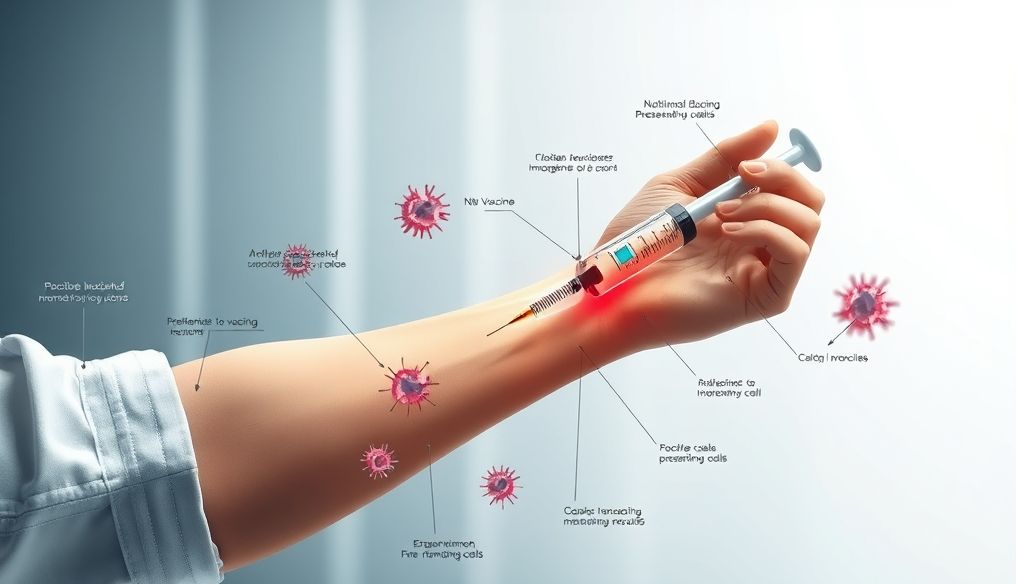How Do Vaccines Work to Protect Our Bodies from Diseases: A Comprehensive Guide?
Vaccines are one of the most important achievements in modern medicine, contributing significantly to eradicating many deadly diseases and preventing their spread. But how exactly do these vaccines work? And how do they protect our bodies from diseases? This is what we will discuss in detail in this article.
What is a Vaccine?
A vaccine is a biological preparation that contains a part of the pathogen (such as a virus or bacteria) or a weakened or dead version of it. When the vaccine is injected into the body, it stimulates the immune system to produce antibodies and immune memory cells, preparing the body to fight off a real infection in the future.
How Vaccines Work
Vaccines work by mimicking a natural infection without causing the disease. Here are the main steps of how vaccines work:
- Antigen Recognition: When the vaccine enters the body, immune cells (such as antigen-presenting cells) recognize the antigen in the vaccine (part of the pathogen).
- Activation of Immune Cells: Antigen-presenting cells display the antigen to Helper T cells, leading to their activation.
- Antibody Production: Helper T cells activate B cells, which are responsible for producing antibodies.
- Formation of Immune Memory Cells: In addition to producing antibodies, immune memory cells are formed, which remain in the body for a long time.
- Rapid Immune Response: If exposed to the real pathogen in the future, memory cells quickly recognize it and begin producing large amounts of antibodies, preventing or reducing the severity of the disease.
Types of Vaccines
There are several types of vaccines, differing in their manufacturing method and the components used. Here are some common types:
- Live Attenuated Vaccines: Contain a live but weakened version of the pathogen. These vaccines stimulate a strong and long-lasting immune response. Example: Measles, Mumps, and Rubella (MMR) vaccine.
- Inactivated Vaccines: Contain a dead version of the pathogen. These vaccines are safe for use in people with weakened immune systems but may require booster doses to maintain immunity. Example: Polio vaccine (IPV).
- Subunit or Component Vaccines: Contain specific parts of the pathogen, such as proteins or sugars. These vaccines are safe and effective but may require booster doses. Example: Hepatitis B vaccine.
- Toxoid Vaccines: Contain toxins that have been modified to become harmless. These vaccines stimulate the production of antibodies that neutralize the toxins produced by the pathogen. Example: Tetanus vaccine.
- mRNA Vaccines: Contain messenger RNA (mRNA) that carries instructions for producing a specific protein from the pathogen. When the vaccine is injected, the body's cells produce this protein, stimulating the immune system to produce antibodies. Example: COVID-19 vaccines from Pfizer and Moderna.
- Viral Vector Vaccines: Use a harmless virus as a vector to carry genetic material from the pathogen to the body's cells. Example: COVID-19 vaccines from AstraZeneca and Johnson & Johnson.
Benefits of Vaccines
Vaccines provide many important benefits, including:
- Disease Prevention: Vaccines prevent infection with many serious infectious diseases, such as polio, measles, tetanus, and hepatitis.
- Reduced Complications: Even if infected with the disease after vaccination, vaccines reduce the severity of the disease and the likelihood of serious complications.
- Community Protection: When a large number of people receive the vaccine, it leads to what is known as "Herd immunity," where people who are unable to be vaccinated (such as infants and people with weakened immune systems) are protected by reducing the spread of the disease in the community.
- Cost Savings: Although the cost of vaccination may seem high, it is much lower than the cost of treating infectious diseases and their complications.
Safety and Side Effects of Vaccines
Vaccines undergo rigorous testing before being approved for use and are generally considered safe. However, some mild side effects may occur after vaccination, such as:
- Pain or redness at the injection site.
- Mild fever.
- Headache or fatigue.
These side effects usually disappear within a few days. Serious side effects are very rare.
Importance of Vaccines in Public Health
Vaccines play a crucial role in improving public health and reducing the spread of infectious diseases. Vaccines have contributed to the eradication of smallpox and polio in many countries and have reduced the spread of measles, mumps, rubella, and other diseases. Vaccines are an essential tool in combating epidemics, such as the COVID-19 pandemic.
Frequently Asked Questions About Vaccines
There are many frequently asked questions about vaccines, including:
Do Vaccines Cause Autism?
No, there is no scientific evidence to prove that vaccines cause autism. These claims have been refuted conclusively by numerous large-scale scientific studies.
Are Vaccines Safe for Infants?
Yes, vaccines are safe for infants. Vaccines are rigorously tested before being approved for use, and the benefits of vaccination far outweigh the potential risks.
Can I Get the Vaccine If I Have Allergies?
If you have a severe allergy to one of the vaccine's components, vaccination may not be suitable for you. You should consult your doctor to assess the potential risks and benefits.
Do I Need Booster Doses of the Vaccine?
The need for booster doses of the vaccine depends on the type of vaccine and the disease it protects against. Some vaccines provide long-lasting immunity, while others require booster doses to maintain immunity.
Recommended Vaccinations
Recommended vaccinations vary by age, gender, and health status. It is recommended to follow the national vaccination schedule set by the Ministry of Health in your country.
Vaccination Schedule for Children:
- At Birth: Hepatitis B vaccine.
- At 2 Months: Diphtheria, Tetanus, and Pertussis (DTaP), Polio (IPV), Haemophilus influenzae type B (Hib), Hepatitis B, Rotavirus (RV), and Pneumococcal (PCV) vaccines.
- At 4 Months: Same vaccines as at 2 months.
- At 6 Months: Same vaccines as at 2 months, plus the influenza vaccine (annually).
- At 12-15 Months: Measles, Mumps, and Rubella (MMR), Varicella (Chickenpox), Pneumococcal (PCV), and Hepatitis A vaccines.
- At 4-6 Years: Booster doses of Diphtheria, Tetanus, and Pertussis (DTaP), Polio (IPV), Measles, Mumps, and Rubella (MMR), and Varicella (Chickenpox) vaccines.
Vaccination Schedule for Adults:
- Influenza Vaccine: Annually.
- Tetanus, Diphtheria, and Pertussis (Tdap) Vaccine: One dose, then a booster dose of Tetanus and Diphtheria (Td) vaccine every 10 years.
- Measles, Mumps, and Rubella (MMR) Vaccine: For adults who have not received the vaccine before.
- Varicella (Chickenpox) Vaccine: For adults who have not had the disease before.
- Shingles Vaccine: For adults aged 50 years or older.
- Pneumococcal Vaccine: For adults aged 65 years or older, or who have certain health conditions.
- Human Papillomavirus (HPV) Vaccine: For adults aged 26 years or younger.
Conclusion
Vaccines are a powerful and effective tool for protecting our bodies from infectious diseases. By understanding how vaccines work, their types, and their benefits, we can make informed decisions about vaccination and protect ourselves and our communities from diseases.
References:




